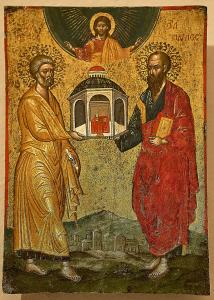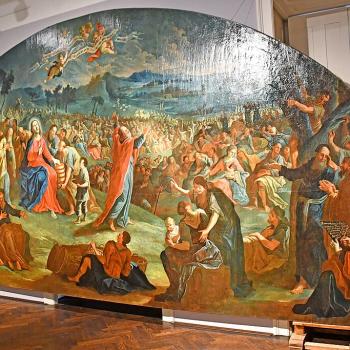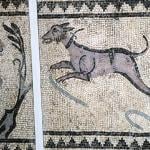
Peter and Paul are remembered for the way they helped establish and develop the structures of the institutional church, structures which were and continue to be vital for church, even if the structures can and should develop over time. Together, they also founded the See of Rome, and with it, the way for their combined authority to be preserved shared with their successors. Because of this, the See of Rome had the rights and privileges, indeed, missions of two apostles connected to it: it was given the leadership of the church through Peter, even as it was given the missionary spirit of Paul, making sure it would serve and guide Christian missions throughout the centuries. Nonetheless, when looking to their successors, the various bishops of Rome, they often found it difficult to balance out the charisms given to them by both Peter and Paul, even as it was often difficult for Peter and Paul to work together in harmony.
Peter and Paul were bound together by Christ. . It was through their love for Christ that they found a way to come together and form a bond of love which connected them, a bond which, like the bond of love found in the Trinity, had them go beyond themselves and look into the world in order to share that love with others. Both of them had their own problems, their own imperfections, even as every successor of theirs would be imperfect, and yet, despite themselves and their imperfections, they were able to complete their missions and hand over the future of the church to others; similarly, every one of their successors are expected to complete their own particular mission, serving Christ, the church, and the world, and in doing so, set the stage for those follow after them. No one who becomes a bishop of Rome is to look as the church as their own possession, but rather, they should view themselves as being the chief servants of the church.
It is important for us to recognize the greatness of Peter and Paul without romanticizing them, without, that is, ignoring their failures. Peter understood he was to spread the Gospel, but in doing so, he learned the church was meant to be inclusive in nature. While he taught what he learned, he often found it difficult to live it out. Peter’s biases and prejudices often got the best of him, which is why he needed Paul to remind him of what he knew was true, that he had to live out the implications of what he taught the church (through the inspiration of the Holy Spirit). Peter had to learn to eat with and associate with those who he would have once viewed as unclean but who were not thanks to their inclusion into the church. Paul, on the other hand, could be very hot-headed; he always thought he knew better than everyone else, and he could and would often act and react brashly, without thinking of what he was doing, which was the foundation for his attacks on Christ and Christ’s church before his conversion, but also, what made many of his friends, like Barnabas, find it extremely difficult to be with him for any length of time. Paul needed Peter to remind him that he was not an absolute authority in and of himself, and that he would have to learn from and accept the direction of others, direction which would help moderate Paul’s extreme tendencies.
By the time of their death, Peter and Paul had learned that their missions could only succeed when they came and worked together. They needed each other so that the imperfections of one could be countered and overcome by the gifts of the other. This is something which we need to learn in the church today. We need each other. We need to learn how to follow Peter and Paul by coming together, serving and helping, not only each other, but the world around us: together, we are strong, together, we get a sense of the mystical body of Christ at work in the world, and together, we will be able to do miracles. When we are divided, fighting against one another, selfishly looking after ourselves and our own private interests, defending our own biases and prejudices, we risk following the example of Judas who was unable to see beyond his vision of Christ. Judas’ betrayal was done, not because he denied Christ, but because he wanted to force Christ to become the messianic king Judas thought he was meant to be.
Peter and Paul followed Christ, and, in the end, they let themselves be stripped of everything as they took on the cross and followed it to their own execution. Peter had even been told by Christ what was to come, as to how he would in his old age be led by someone else who would take him where he did not want to go. Paul, on the other hand, had come to accept his own death, knowing that every day he remained alive, it gave Christ another day to live in and work with him, but when he died, that he would find himself glorified in and with Christ. What Paul learned was correct. After they were executed, Peter and Paul were glorified, but we find, just as Christ did not leave us after his ascension, so the spirit of Peter and Paul did not leave us after their death, as it is found residing in and with their successors in the See of Rome. Peter is said to speak through the papacy when there is extreme need for an authoritative response to some critical concern for the church community, such as we find happened when St. Leo the Great wrote his Tome. Peter was the first to use that authority when he declared Jesus was the Christ, and he also used it when he indicated that the institutional church’s mission extended to the Gentiles, revealing the church was meant to be inclusive in nature and not restricted to the Jews. The papacy, however, also speaks with and through Paul, especially when the Pope speaks on what is expected of us in regards the way we are to love one another, in regards the discipline expected to promote that love, indeed, in regards the way we are to follow through with the inclusive nature of the church by being open with and show love and care to those who are different from us, those who we might otherwise have had prejudicial thoughts against, thoughts which would have us be inhospitable to them. Paul’s intervention with Peter is the kind which we need to hear in the church today as too many follow Peter’s error and have become inhospitable to those deemed other.
It is because the papacy continues the legacy of Peter and Paul, and not just one or the other, it has a double-authority, the kind which is needed to prove its central place in the institutional church, and why, as St. Irenaeus said, all churches should look to and follow the authoritative guidance of the see of Rome. It is this double authority, and not just the authority of Peter, which needs to be brought forth, so that the See of Rome continues to act and promote the delicate balance which Peter and Paul finally found between themselves.
Stay in touch! Like A Little Bit of Nothing on Facebook.
If you liked what you read, please consider sharing it with your friends and family!
N.B.: While I read comments to moderate them, I rarely respond to them. If I don’t respond to your comment directly, don’t assume I am unthankful for it. I appreciate it. But I want readers to feel free to ask questions, and hopefully, dialogue with each other. I have shared what I wanted to say, though some responses will get a brief reply by me, or, if I find it interesting and something I can engage fully, as the foundation for another post. I have had many posts inspired or improved upon thanks to my readers.











